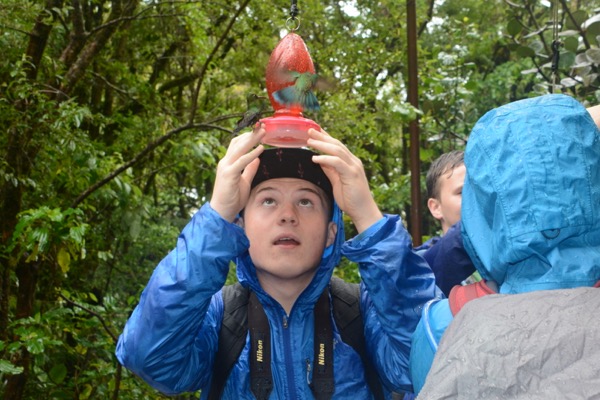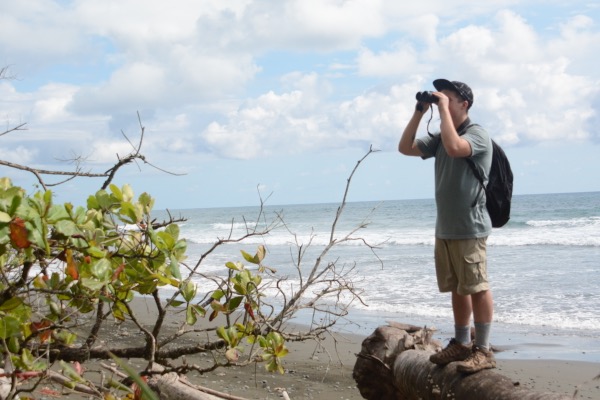


Costa Rican conservation
Study abroad program draws students with varied environmental interests
9:23 a.m., March 25, 2015--While people often say they experienced culture shock when visiting another country, a group of University of Delaware students who studied abroad in Costa Rica this Winter Session say the shock occurred when they got home.
“My perspective changed on American culture,” said Nate Harlan, a sophomore in the Associate in Arts Program, who was one of 13 students participating in the four-week study abroad program offered by the Department of Entomology and Wildlife Ecology.
Global Stories
Fulbright awards
Peace Corps plans
“Everyone in Costa Rica was so friendly and … so happy. It’s a different culture going to the U.S., where people are reserved and keep to themselves. The culture shock was more coming home than arriving at Costa Rica.”
Students Trevor Hall and Jenny Schmidt had the same experience after returning home from the Central American nation that is focused on conservation of its natural resources.
Hall, an environmental science major, and Schmidt, a wildlife conservation major, who are both minoring in environmental humanities, described the ecotourism and community sustainability efforts in Costa Rica as eye opening.
“I wish the rest of the world could be like this,” Hall said.
The students arrived in San Jose, the capital of Costa Rica, on Jan. 4. During the course of the trip, they traveled to multiple sites across the country, which is about the size of West Virginia. Costa Rica has a greatly varied landscape and climate, so students were exposed to many different environmental features.
During the trip, students completed day-to-day team-building activities and researched Costa Rican bird diversity by completing bird counts and creating statistical models. Students also led discussions on relevant biodiversity issues. They completed coursework in tropical biodiversity and conservation biology.
While in Nancité, a research beach, students participated in a project where they helped baby sea turtles make their voyage to the ocean. Students also participated in a challenging hike up Death Mountain, where they experienced drastic climatic changes from its base to its peak.
There was a large demand for the long-running and popular study abroad program, but only 13 spots were available. While many of the students selected were majoring in wildlife ecology and conservation, there were a variety of interests and backgrounds represented.
Harlan went on the Costa Rica trip because of his interests in sustainable agriculture. He heard about the program from a friend’s recommendation.
Like Hall and Schmidt, study abroad participant Emily Slingerland is enrolled in the environmental humanities minor, a relatively new minor in the Department of English. The 18-credit minor is targeted to two groups of students: those majoring in the sciences who want to pursue a deeper understanding of environmental issues and better means of communication, and those who want to study science without majoring in the sciences.
Slingerland, whose major is wildlife conservation, said that studying environmental humanities “allows me to expand my knowledge and learn more as to how humanity and environment interact.”
“There is often a lot of conflict between the two, and this minor will hopefully give me the knowledge to help solve environmental problems in the future,” she said.
About the Associate in Arts program
UD’s Associate in Arts program, operated by the College of Arts and Sciences, is open only to Delawareans. Courses meet on campuses in New Castle, Kent and Sussex counties and prepare students for a smooth transition to the Newark campus for baccalaureate studies after completion of the 60 credits needed for an associate degree.
Students in the program take regular University courses taught by UD faculty, in a setting that offers small class sizes and close interaction with faculty and advisers. As in Harlan’s case, the students are able to participate in almost all activities and programs available on the Newark campus, including study abroad, said faculty director Jack Bartley.
“Our students are very aware that they can participate in study abroad programs, and we have been fairly successful in getting them enrolled,” Bartley said. “I take 15-18 students each year to Hawaii, and I have had several Associate in Arts Program students [in those groups].
“We promote study abroad at our decision nights and at our new student orientation functions, as well as in the classrooms. Basically, Associate in Arts Program students can participate in just about any activity on the Newark campus, in academics and extracurricular.”
Harlan, who attends classes on the Wilmington campus, said the program does a good job of informing students about events and opportunities on the Newark campus and that he feels integrated into that community. He is involved in various organizations, such as Students for the Environment, a UD student-run group, and plans to transition to the Newark campus next year to complete his bachelor’s degree.
Article by Ashley Heller
Photos by Laura Manser











